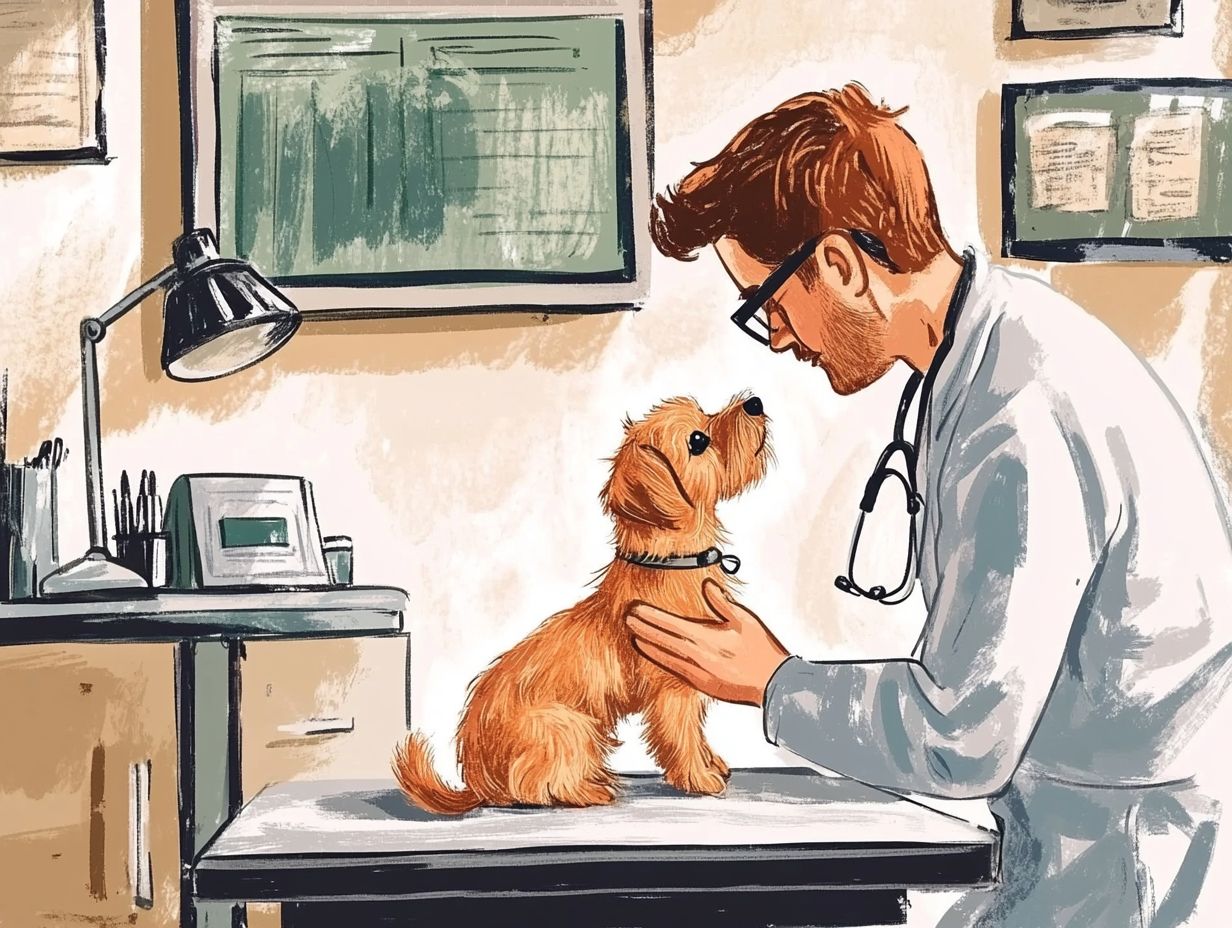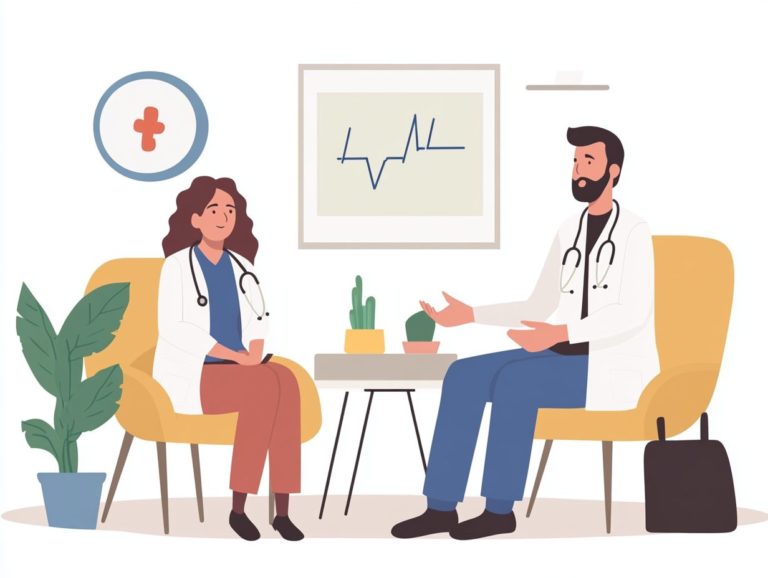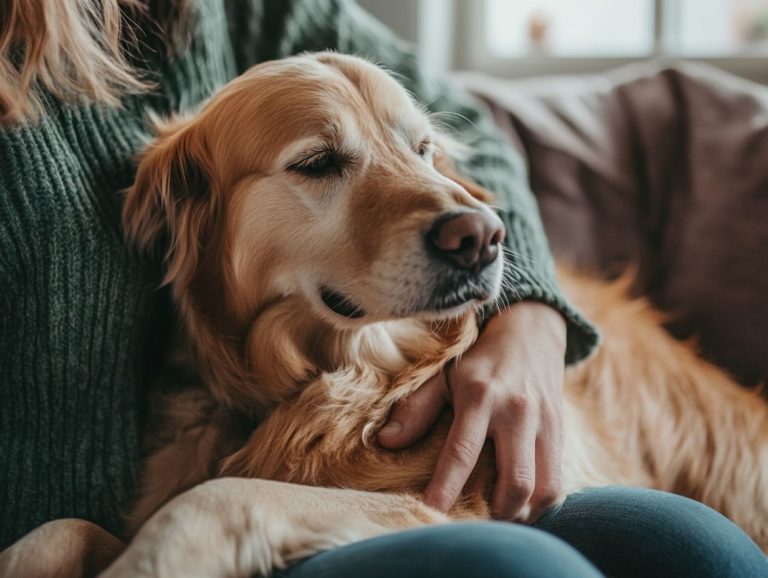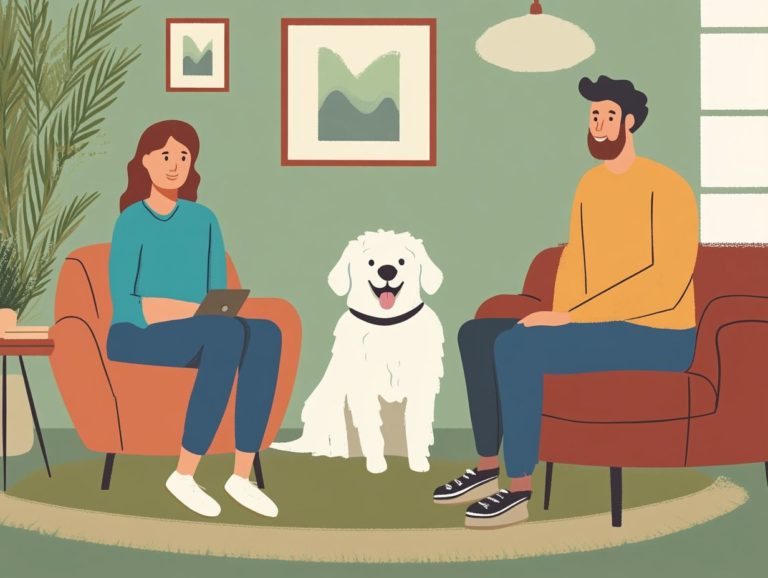The Role of Veterinary Professionals in Pet Anxiety
Pet anxiety is an increasing concern for both you and your furry companions. It impacts their wellbeing and disrupts the harmony of your household.
Understanding the causes and effects of anxiety in pets is essential for creating a healthier environment for everyone.
This article delves into various triggers of pet anxiety. It highlights the crucial role veterinarians play in managing these issues and presents a range of treatment options available to you.
With effective tips for preventing anxiety, you can foster a more peaceful and nurturing life for your beloved pets.
Contents
Key Takeaways:
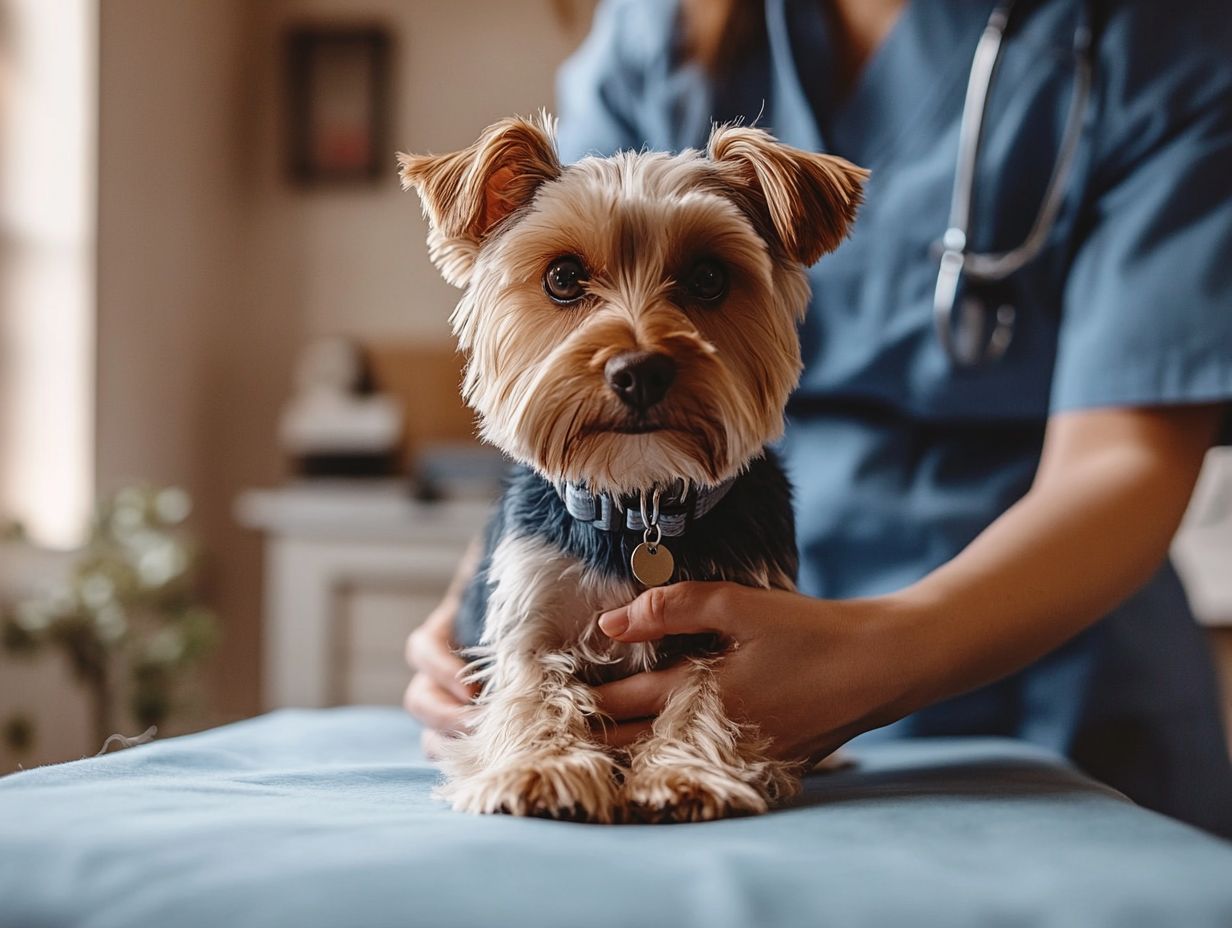
- Veterinary professionals play a crucial role in identifying and managing pet anxiety, benefiting both the pet and their owner.
- By understanding the triggers and contributing factors, veterinarians can provide personalized treatment plans for each pet.
- Preventing pet anxiety is possible through proper education and communication between veterinary professionals and pet owners, leading to a happier and healthier pet.
The Impact of Pet Anxiety
Pet anxiety doesn’t just affect pets; it also influences the lives of their owners. Understanding the needs of anxious pets is an emotional relationship that deserves the attention of veterinary professionals.
Recognizing the impact of anxiety is crucial for improving pet wellbeing. It can lead to a range of behavioral issues that diminish the quality of life for both pets and their caregivers.
Sometimes, it requires professional help. Tackling pet anxiety is essential for cultivating a nurturing environment that promotes emotional recovery and stability for everyone involved.
Understanding the Effects on Pets and Owners
The effects of pet anxiety are profound, impacting both pets and their owners. It often leads to high-stress situations that may necessitate emotional support and veterinary intervention.
As your pet grapples with anxiety, you may notice changes in their behavior excessive barking, aggression, or withdrawal. These behaviors can be particularly distressing for you as their human companion.
The emotional toll you experience becomes apparent as you navigate feelings of helplessness and concern for your furry family member. Veterinary clinics must recognize these emotional dynamics during consultations.
By encouraging open communication between the veterinary team and you, they can better tailor their strategies. This includes providing resources such as behavioral training, anxiety-reducing products, and regular check-ins to support both you and your pet throughout this challenging journey.
Causes of Pet Anxiety
Grasping the causes of pet anxiety is essential for both veterinary professionals and pet owners. By identifying the specific triggers, you can significantly enhance your approach to effective management and treatment strategies, and understanding what makes a great pet anxiety specialist can be a valuable part of this process.
Understanding these triggers can unlock a happier, healthier life for your pets! This knowledge helps build a stronger bond between you and your furry companions.
Identifying Triggers and Contributing Factors
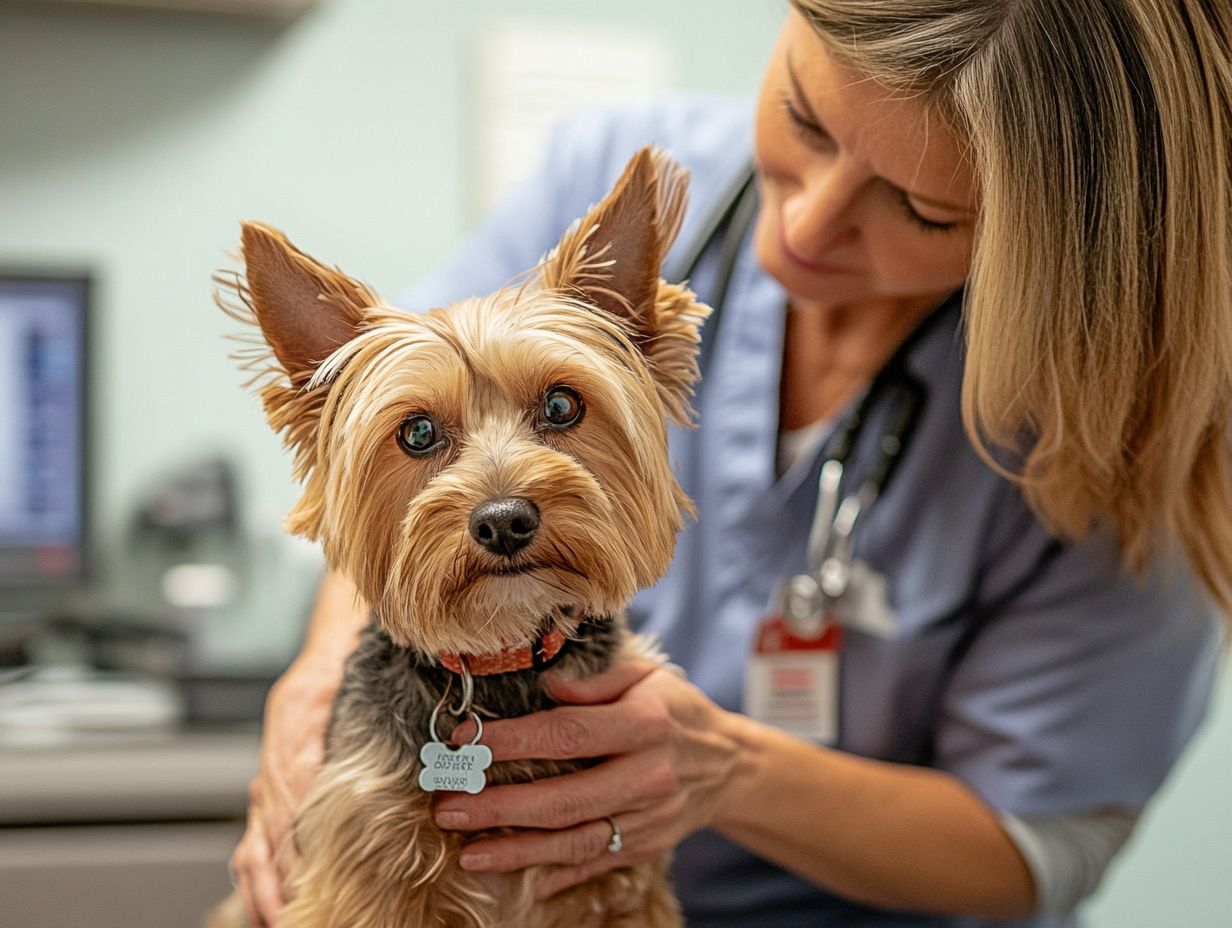
Identifying triggers and contributing factors of your pet’s anxiety is crucial for crafting effective care plans tailored to their unique needs.
Veterinary professionals use various techniques to pinpoint these anxiety triggers during examinations. One common approach involves conducting thorough behavioral assessments, and they may also explore understanding play therapy for anxious pets to help address these issues.
During these assessments, veterinarians observe your pet in various settings to identify specific stressors, such as loud noises or unfamiliar environments. Emotional fatigue indicators like excessive panting or withdrawal are also monitored to gauge your pet’s emotional state.
Case studies illustrate these methods in action. For instance, a dog that displayed fear during vet visits was evaluated through observations that uncovered a sensitivity to particular scents.
This insight led to alternative strategies for managing anxiety in future visits, ensuring your pet receives the best possible care.
The Role of Veterinary Professionals
Veterinary professionals hold a vital position in addressing pet anxiety. They provide not just medical expertise but also essential emotional support for both pets and their owners during high-stress situations, particularly in veterinary clinics. Understanding the role of diet in pet anxiety can further aid in managing these challenges effectively.
Your understanding and compassion can make all the difference, helping to create a calming environment for those who are anxious and worried.
How Veterinarians Can Help Manage Pet Anxiety
Veterinarians can play a vital role in managing your pet’s anxiety through a blend of training methods, low-stress handling techniques, and tailored anxiety management strategies. For more insights, check out understanding different types of pet anxiety experts. This approach promotes happy visits.
By creating positive associations during veterinary visits, they ensure your pet feels more comfortable and relaxed in what can often be a stressful environment. A compassionate team takes the time to discuss treatment costs transparently, which is crucial for building trust with you as a pet owner.
Emphasizing the importance of a supportive veterinary team reassures both you and your pet that you are not navigating these challenges alone. This holistic approach fosters a calm atmosphere conducive to effective treatment, ultimately enhancing the overall well-being of your beloved companion.
Treatment Options for Pet Anxiety
When it comes to treating pet anxiety, you have access to a diverse array of options. These include medications, behavioral therapies, and consultations with veterinary behaviorists, all aimed at crafting a comprehensive care plan tailored specifically for your pet’s needs.
Medications, Therapies, and Other Approaches
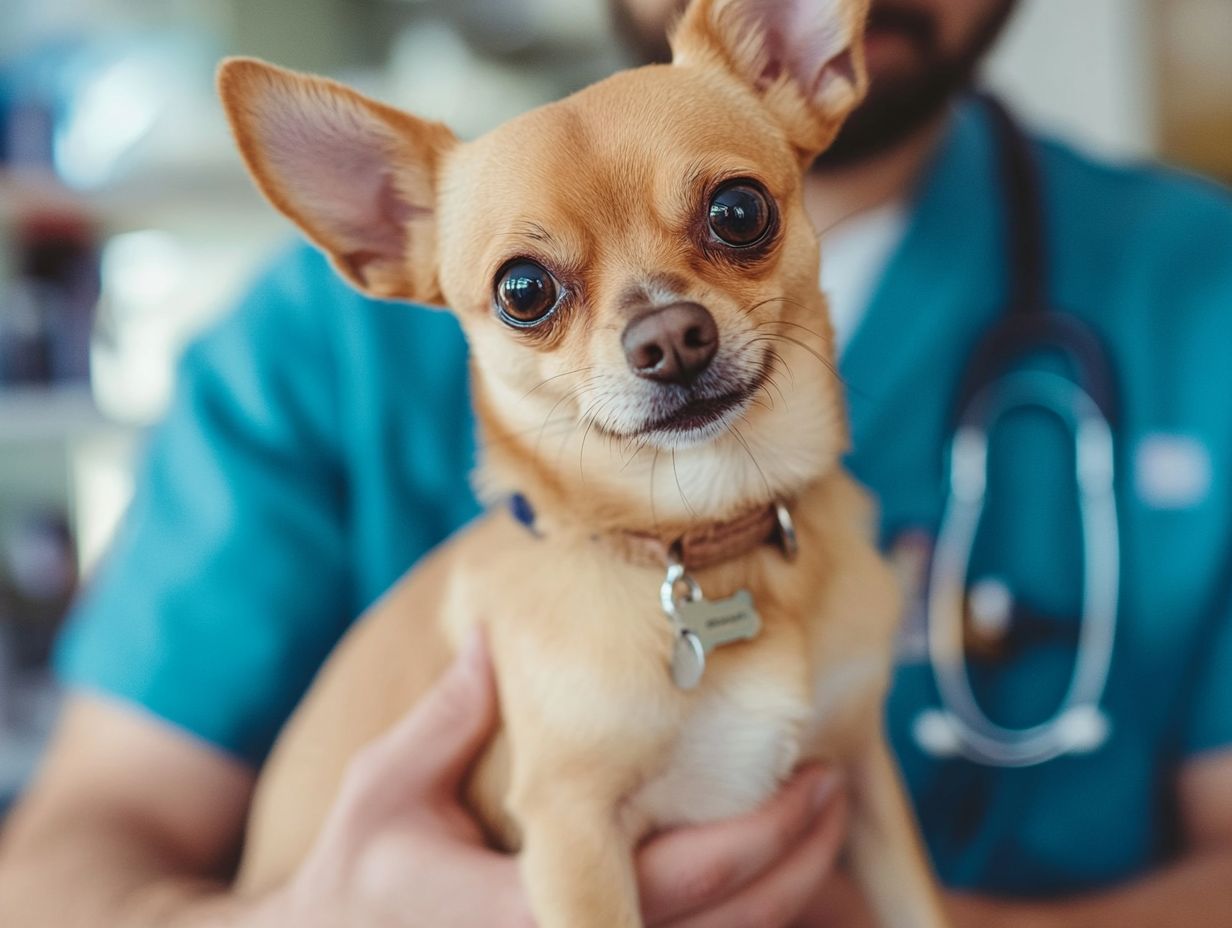
Medications, therapies, and various approaches are essential components of anxiety management for your pets. Thorough assessment and meticulous documentation in their emotional record are vital for ongoing veterinary care.
Understanding the unique needs of each animal is crucial; after all, not every pet responds the same way to different treatments. There are various types of medications specifically designed to alleviate anxiety symptoms, including medications that help reduce anxiety.
In tandem with these pharmaceuticals, behavioral therapies like desensitization and positive reinforcement can cultivate a more serene demeanor in your furry companions. Preventative services, such as routine check-ups and lifestyle adjustments, also play a significant role in enhancing overall emotional well-being.
By ensuring a comprehensive evaluation is conducted, you can work alongside your veterinarian to develop a tailored treatment plan that considers both behavioral and psychological factors for your pet.
Preventing Pet Anxiety
Preventing pet anxiety is a continuous journey that requires your proactive efforts combined with the emotional support of veterinary professionals. Understanding what makes an effective pet anxiety counselor can further enhance your ability to foster a nurturing environment, helping your pet feel secure and at ease.
Tips for Reducing Anxiety in Pets
To reduce anxiety in your pets, focus on creating positive associations, implementing effective training techniques, and recognizing the signs of anxiety. This helps you manage their stress levels and ensures you communicate any issues to your veterinary team.
By integrating a variety of methods, you can cultivate an environment that promotes comfort and security for your beloved companions. For instance, consider using desensitization techniques during training sessions to help your pets gradually adjust to situations that once triggered their anxiety.
Being attuned to specific cues like excessive panting or pacing allows you to proactively address your pet’s needs. Incorporating calming tools, such as anxiety wraps or pheromone diffusers, can significantly enhance your pet’s overall comfort especially during potentially stressful situations like veterinary visits.
This proactive approach ultimately leads to a more serene experience for both you and your furry friend.
Frequently Asked Questions
What is the role of veterinary professionals in pet anxiety and emotional support?
Veterinary professionals play a critical role in providing medical care, emotional support, and guidance for pet owners in managing anxiety. They offer tailored treatment plans, and understanding what your vet wants you to know about anxiety can be vital to ensuring the well-being of pets.
Don’t wait! Start preventing anxiety today! Consult your veterinarian to create a tailored plan for your pet!
Veterinary Professionals and Pet Anxiety
Veterinary professionals play a crucial role in identifying and treating pet anxiety. They recognize anxiety signs and can guide you on when to consult a professional for pet anxiety and offer effective management strategies.
Common Signs of Pet Anxiety
Signs of pet anxiety include excessive panting, pacing, and trembling. Pets may also exhibit destructive behaviors or changes in eating and bathroom habits.
How Veterinary Professionals Help
The management of pet anxiety involves various methods. These include training to change behaviors, prescription medications, and natural calming therapies like pheromone therapy or acupuncture.
Is Pet Anxiety Common?
Yes, many pets experience anxiety. It can stem from changes in routine, past trauma, or genetics.
Managing Pet Anxiety
While there isn’t a quick fix, veterinary professionals can help manage anxiety effectively. For those seeking professional help, understanding the cost of pet anxiety experts is crucial. Pets can learn to cope and lead happier lives with the right guidance.
What to Do If You Suspect Anxiety
Consult a veterinary professional if you think your pet may have anxiety. They will create a personalized treatment plan for your pet.
